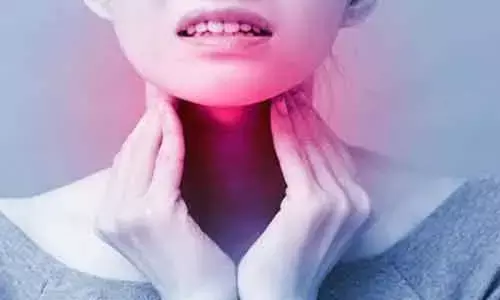- Home
- Medical news & Guidelines
- Anesthesiology
- Cardiology and CTVS
- Critical Care
- Dentistry
- Dermatology
- Diabetes and Endocrinology
- ENT
- Gastroenterology
- Medicine
- Nephrology
- Neurology
- Obstretics-Gynaecology
- Oncology
- Ophthalmology
- Orthopaedics
- Pediatrics-Neonatology
- Psychiatry
- Pulmonology
- Radiology
- Surgery
- Urology
- Laboratory Medicine
- Diet
- Nursing
- Paramedical
- Physiotherapy
- Health news
- Fact Check
- Bone Health Fact Check
- Brain Health Fact Check
- Cancer Related Fact Check
- Child Care Fact Check
- Dental and oral health fact check
- Diabetes and metabolic health fact check
- Diet and Nutrition Fact Check
- Eye and ENT Care Fact Check
- Fitness fact check
- Gut health fact check
- Heart health fact check
- Kidney health fact check
- Medical education fact check
- Men's health fact check
- Respiratory fact check
- Skin and hair care fact check
- Vaccine and Immunization fact check
- Women's health fact check
- AYUSH
- State News
- Andaman and Nicobar Islands
- Andhra Pradesh
- Arunachal Pradesh
- Assam
- Bihar
- Chandigarh
- Chattisgarh
- Dadra and Nagar Haveli
- Daman and Diu
- Delhi
- Goa
- Gujarat
- Haryana
- Himachal Pradesh
- Jammu & Kashmir
- Jharkhand
- Karnataka
- Kerala
- Ladakh
- Lakshadweep
- Madhya Pradesh
- Maharashtra
- Manipur
- Meghalaya
- Mizoram
- Nagaland
- Odisha
- Puducherry
- Punjab
- Rajasthan
- Sikkim
- Tamil Nadu
- Telangana
- Tripura
- Uttar Pradesh
- Uttrakhand
- West Bengal
- Medical Education
- Industry
NICE guideline advocates radioactive iodine use as frontline treatment for hyperthyroidism

The UK National Institute for Health and Care Excellence (NICE) has released guidelines for the management and monitoring of hyperthyroidism in adults. According to the recommendations, published in a guideline summary in BMJ, the use of radioactive iodine resulted in the cure of as many as 90% of hyperthyroidism cases.
Existing conventional recommendations are to treat patients with antithyroid drugs called thionamides, and in the UK and Europe radioactive iodine is often only given if they suffer a relapse after this treatment.
The guideline lay heavier emphasis on the use of radioactive iodine as the frontline treatment for patients unlikely to remain remission-free on the medications, as opposed to the alternative of antithyroid medications as a first choice.
Thyroid disease, comprising thyroid dysfunction and enlargement, is common and often identified in primary care. Conditions causing thyroid dysfunction can be broadly divided into those that result in thyroid gland underactivity (overt and subclinical hypothyroidism) or overactivity (thyrotoxicosis). Hypothyroidism is usually managed by general practitioners.
Key recommendations include:
- A starting levothyroxine dose of 1.6 μg/kg/day (rounded to the nearest 25 μg) is recommended for adults under 65 years old with primary hypothyroidism and no history of cardiovascular disease.
- A starting levothyroxine dose of 25-50 μg/day with titration is recommended for adults aged 65 and over and adults with a history of cardiovascular disease.
- Natural thyroid extract is not recommended and liothyronine (alone or in combination with levothyroxine) is not routinely recommended for treating people with primary hypothyroidism.
- Aim to maintain thyroid-stimulating hormone (TSH) levels within the reference range when treating primary hypothyroidism with levothyroxine; if symptoms persist consider adjusting the dose of levothyroxine further to achieve optimal wellbeing, but avoid using doses that cause TSH suppression or thyrotoxicosis.
- Radioactive iodine is recommended as first-line treatment for thyrotoxicosis with hyperthyroidism unless antithyroid drugs are likely to achieve remission or it is unsuitable.
"Our evidence reviews indicated that radioactive iodine is the most clinically and cost-effective treatment for hyperthyroidism," senior author Kristien Boelaert, MD, PhD, who led the guideline committee, told Medscape Medical News.
"Recommending the use of radioactive iodine as first-line treatment for adults with Graves' disease is a change to current practice and should reduce the variation between centres as to when radioactive iodine is considered appropriate," the guidelines further state.
Individuals treated with radioactive iodine take a single tablet that contains iodine and a low dose of radiation, which is absorbed by the thyroid. After taking the treatment patients are advised to avoid prolonged close contact with children and pregnant women for a few days or weeks and avoid getting pregnant or fathering a child for several months. The treatment is likely to lead to an underactive thyroid gland which will require ongoing treatment with thyroid hormone tablets.
Current guidelines in the UK and Europe typically call for radioactive iodine to be reserved for use as a definitive treatment only after relapse following antithyroid medication treatment. The latest European Thyroid Association guidelines were published in 2018.
References:
"Thyroid disease assessment and management: summary of NICE guidance," is published in the journal BMJ. DOI: https://doi.org/10.1136/bmj.m41
Thyroid disease: assessment and management www.nice.org
Dr Kamal Kant Kohli-MBBS, DTCD- a chest specialist with more than 30 years of practice and a flair for writing clinical articles, Dr Kamal Kant Kohli joined Medical Dialogues as a Chief Editor of Medical News. Besides writing articles, as an editor, he proofreads and verifies all the medical content published on Medical Dialogues including those coming from journals, studies,medical conferences,guidelines etc. Email: drkohli@medicaldialogues.in. Contact no. 011-43720751


